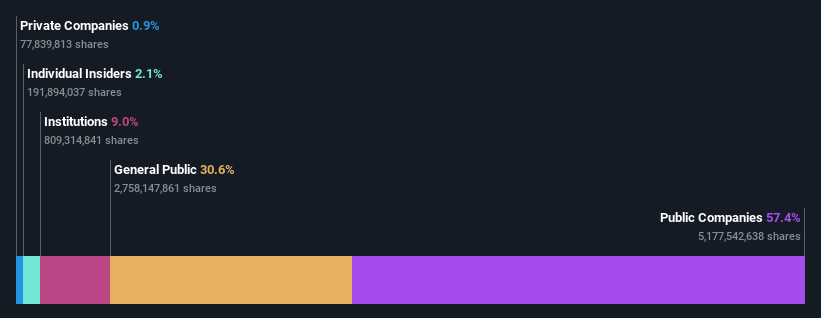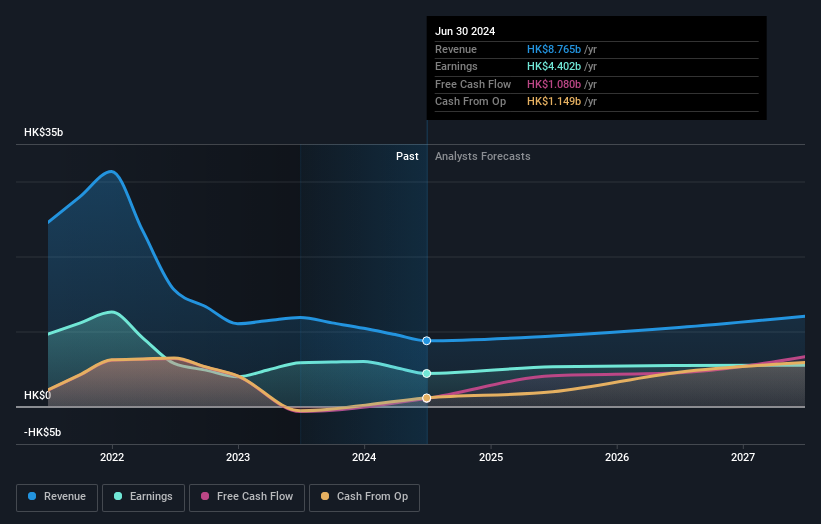- Hong Kong
- /
- Real Estate
- /
- SEHK:83
Sino Land Company Limited's (HKG:83) top owners are public companies with 57% stake, while 31% is held by individual investors

Key Insights
- Significant control over Sino Land by public companies implies that the general public has more power to influence management and governance-related decisions
- 57% of the company is held by a single shareholder (Tsim Sha Tsui Properties Limited)
- Insiders have bought recently
If you want to know who really controls Sino Land Company Limited (HKG:83), then you'll have to look at the makeup of its share registry. And the group that holds the biggest piece of the pie are public companies with 57% ownership. That is, the group stands to benefit the most if the stock rises (or lose the most if there is a downturn).
Individual investors, on the other hand, account for 31% of the company's stockholders.
Let's delve deeper into each type of owner of Sino Land, beginning with the chart below.
View our latest analysis for Sino Land

What Does The Institutional Ownership Tell Us About Sino Land?
Institutional investors commonly compare their own returns to the returns of a commonly followed index. So they generally do consider buying larger companies that are included in the relevant benchmark index.
We can see that Sino Land does have institutional investors; and they hold a good portion of the company's stock. This suggests some credibility amongst professional investors. But we can't rely on that fact alone since institutions make bad investments sometimes, just like everyone does. It is not uncommon to see a big share price drop if two large institutional investors try to sell out of a stock at the same time. So it is worth checking the past earnings trajectory of Sino Land, (below). Of course, keep in mind that there are other factors to consider, too.

We note that hedge funds don't have a meaningful investment in Sino Land. Our data shows that Tsim Sha Tsui Properties Limited is the largest shareholder with 57% of shares outstanding. With such a huge stake in the ownership, we infer that they have significant control of the future of the company. Meanwhile, the second and third largest shareholders, hold 2.1% and 1.9%, of the shares outstanding, respectively. Chee Siong Ng, who is the second-largest shareholder, also happens to hold the title of Chief Executive Officer.
While it makes sense to study institutional ownership data for a company, it also makes sense to study analyst sentiments to know which way the wind is blowing. There are a reasonable number of analysts covering the stock, so it might be useful to find out their aggregate view on the future.
Insider Ownership Of Sino Land
The definition of company insiders can be subjective and does vary between jurisdictions. Our data reflects individual insiders, capturing board members at the very least. The company management answer to the board and the latter should represent the interests of shareholders. Notably, sometimes top-level managers are on the board themselves.
Insider ownership is positive when it signals leadership are thinking like the true owners of the company. However, high insider ownership can also give immense power to a small group within the company. This can be negative in some circumstances.
We can report that insiders do own shares in Sino Land Company Limited. It is a very large company, and board members collectively own HK$1.5b worth of shares (at current prices). Most would say this shows a good alignment of interests between shareholders and the board. Still, it might be worth checking if those insiders have been selling.
General Public Ownership
With a 31% ownership, the general public, mostly comprising of individual investors, have some degree of sway over Sino Land. While this size of ownership may not be enough to sway a policy decision in their favour, they can still make a collective impact on company policies.
Public Company Ownership
It appears to us that public companies own 57% of Sino Land. We can't be certain but it is quite possible this is a strategic stake. The businesses may be similar, or work together.
Next Steps:
I find it very interesting to look at who exactly owns a company. But to truly gain insight, we need to consider other information, too. Like risks, for instance. Every company has them, and we've spotted 2 warning signs for Sino Land (of which 1 shouldn't be ignored!) you should know about.
Ultimately the future is most important. You can access this free report on analyst forecasts for the company.
NB: Figures in this article are calculated using data from the last twelve months, which refer to the 12-month period ending on the last date of the month the financial statement is dated. This may not be consistent with full year annual report figures.
New: Manage All Your Stock Portfolios in One Place
We've created the ultimate portfolio companion for stock investors, and it's free.
• Connect an unlimited number of Portfolios and see your total in one currency
• Be alerted to new Warning Signs or Risks via email or mobile
• Track the Fair Value of your stocks
Have feedback on this article? Concerned about the content? Get in touch with us directly. Alternatively, email editorial-team (at) simplywallst.com.
This article by Simply Wall St is general in nature. We provide commentary based on historical data and analyst forecasts only using an unbiased methodology and our articles are not intended to be financial advice. It does not constitute a recommendation to buy or sell any stock, and does not take account of your objectives, or your financial situation. We aim to bring you long-term focused analysis driven by fundamental data. Note that our analysis may not factor in the latest price-sensitive company announcements or qualitative material. Simply Wall St has no position in any stocks mentioned.
About SEHK:83
Sino Land
An investment holding company, invests in, develops, manages, and trades in properties.
Excellent balance sheet with moderate growth potential.
Market Insights
Community Narratives



